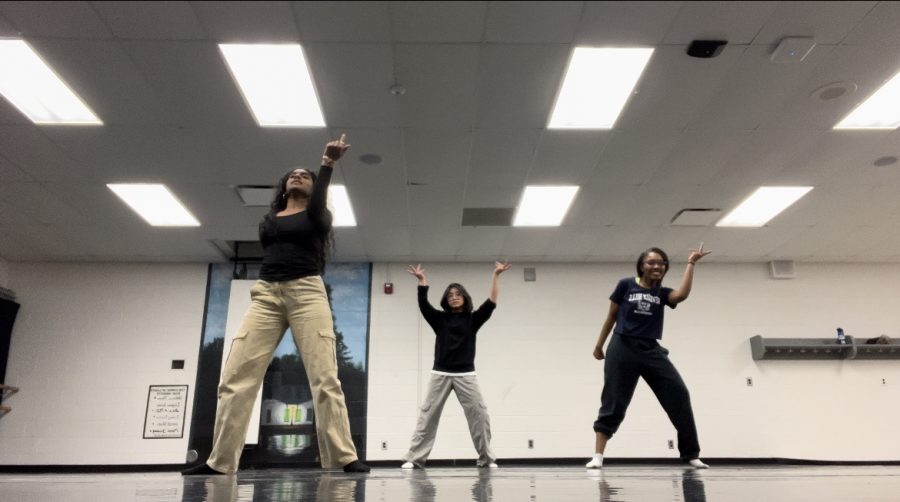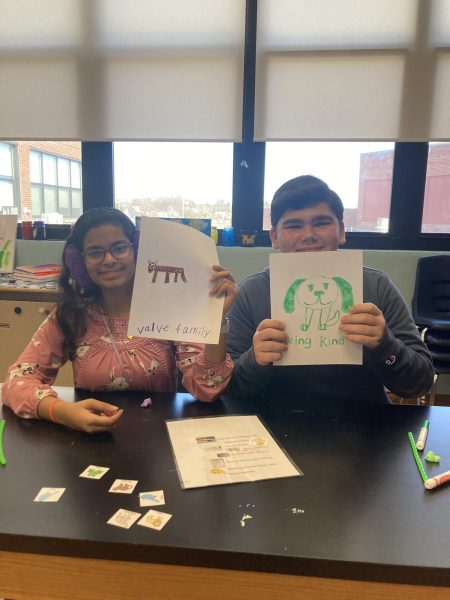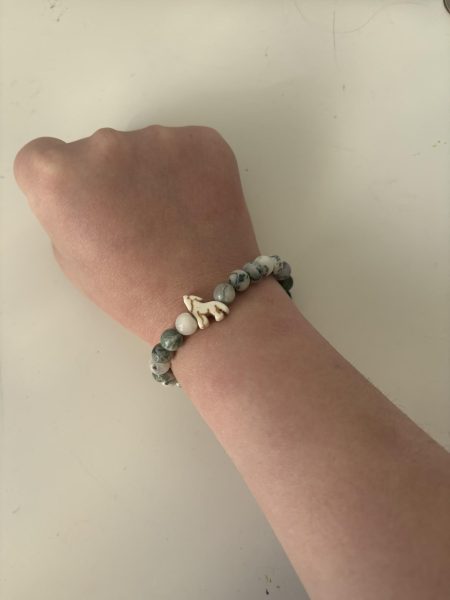Diversity, inclusivity at P-CEP: Students, staff share their experiences
Kanisha Reese, Canton senior (right), and other members of Chroma K-pop Club and Dance Crew practice a routine from their performance during the 2021-2022 school year. Photographer: Ren Gadon (May 3, 2023)
The lights are dimmed down, with only the warm spotlights illuminating the Salem dance room. Sitting criss-cross in a circle, Kanisha Reese, an African American senior at Canton High School, and other members of the Chroma K-pop Club and Dance Crew at the Plymouth-Canton Educational Park (P-CEP) discuss their experiences as people of color. Heavy topics get laughed about to ease the tension as everyone gains an understanding of each others’ experiences.
“Whatever the situation might have happened to either one of us, we can all relate and understand how that wasn’t right, that wasn’t okay, and how that should have been addressed better,” said Reese.
As a person with friends of various cultures, Reese enjoys the diversity among P-CEP students.
Kanisha Reese, Canton senior (right), and other members of Chroma K-pop Club and Dance Crew practice a routine from their performance during the 2021-2022 school year. Photographer: Ren Gadon (May 3, 2023)
P-CEP offers an extensive curriculum, with various culture-related classes such as Multicultural Literature and African American Literature, and in the IB Academy, World Religions. Many students find their instruction in the classes to be enlightening and a safe space to talk about their experiences as a person of those cultures.
Canton English teacher Amanda Chaaban, a Lebanese American, said that throughout her time teaching Multicultural Literature, she has seen people learn new perspectives.
“I had a couple of students who were very stuck in their beliefs about specific cultures, whether it be about oppression or the belief that women had no rights,” said Chaaban. “Through the discussion of different literary pieces and narratives, as well as the students’ own personal experiences, we were able to disprove some of these beliefs and instead present a different perspective.”
According to U.S. News, P-CEP is diverse in its student population, with minorities making up 34.1% of the population.
The Park offers numerous cultural clubs, such as the Black Student Union and the Indian American Student Association in which students of all backgrounds may participate.
Canton social studies teacher Richard Mui, a Chinese American and advisor of the Asian Pacific Islander American Club (APAC), says that for many members of APAC, the club is a place for them to talk about issues and their experiences that they normally would not be comfortable sharing with friends or in a classroom setting.
“One of the things that we kind of say throughout the year, as always, is that you’re not going to be a professional Asian American,” says Mui. “So hopefully, by being part of APAC, you’re more comfortable with yourself, your ethnicity, [and] who you are as a person so it doesn’t have to be a decision of one or the other.”
While P-CEP has a diverse student body, some students and staff believe that P-CEP does not always demonstrate adequate inclusivity and diversity, as microaggressions and slight acts of ignorance still occur on campus.
“Some of our teachers are a bit fake woke,” said Emily Postler, a White American and senior at Canton High School.
According to Postler, one of her teachers asked a Muslim student why she did not wear a hijab, which Postler considers to be a very personal thing to ask.
To address acts of hate or bias committed by students and staff, students and families can report incidents through the Hate and Bias Reporting Form on the official website for P-CEP.
According to a chart entitled “Racial disparity in Michigan schools” sourced from the Michigan Center for Educational Performance and Information and published in The Detroit Free Press, as of 2019, Black teachers make up 2% of the staff in Plymouth-Canton Community Schools, while Black students comprise nearly 10% of the student body.
“I think my whole time, my whole career at P-CEP, I’ve had maybe one teacher that looked like me,” said Reese. “But, he was a man. So again, very, very little [representation] that I’ve seen.”
Having a staff whose race does not proportionally reflect the demographics of the students impacts learners as some high schoolers feel that teachers who are of a different race will not be able to relate to them.
“I don’t feel comfortable [sharing experiences as a person of color with teachers of different racial backgrounds]. I really don’t,” said Reese. “Even though they have that gateway of ‘If anything happens, you can talk to us.’”
Reese stated that because most of her teachers are White, she feels that “they won’t understand how it [the shared POC experience] feels coming from a person of color.” She said she would rather not have to go through the process of having to explain the emotions she feels during negative encounters surrounding her racial background and she would instead prefer to talk with a teacher of the same racial background who has experienced similar situations.
P-CCS seems to be working to address the disparity. One of the objectives according to the district’s Human Resources Staff Page is to “develop and support strategies for recruitment and retention of a diverse workforce.” The district also provides professional development programs that support diversity, equity and inclusion.
Mui believes that P-CEP has evolved over the years when it comes to diversity, inclusivity, and equity. “First, just in the student population itself, it’s diversified,” said Mui. “This [and] the staff. There are more people of color on the staff, and I think that was done with intention.”
Your donation will support the student journalists of Salem High School - MI. Your contribution will allow us to purchase equipment and cover our annual website hosting costs.







